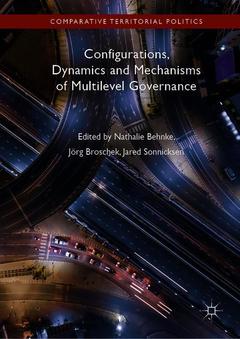Configurations, Dynamics and Mechanisms of Multilevel Governance, 1st ed. 2019 Comparative Territorial Politics Series
Coordonnateurs : Behnke Nathalie, Broschek Jörg, Sonnicksen Jared

This edited volume provides a comprehensive overview of the diverse and multi-faceted research on governance in multilevel systems. The book features a collection of cutting-edge trans-Atlantic contributions, covering topics such as federalism, decentralization as well as various forms and processes of regionalization and Europeanization. While the field of multilevel governance is comparatively young, research in the subject has also come of age as considerable theoretical, conceptual and empirical advances have been achieved since the first influential works were published in the early noughties. The present volume aims to gauge the state-of-the-art in the different research areas as it brings together a selection of original contributions that are united by a variety of configurations, dynamics and mechanisms related to governing in multilevel systems.
Nathalie Behnke is Professor of Public Administration and Public Policy at the Institute for Political Science, TU Darmstadt, Germany.
Jörg Broschek is Canada Research Chair in Comparative Federalism and Multilevel Governance and Associate Professor of Political Science at Wilfrid Laurier University, Canada.
Jared Sonnicksen is Senior Researcher at the Institute for Political Science, TU Darmstadt, Germany.
Provides a compelling argument for the broad applicability of basic notions of multilevel dynamics
Illustrates the conceptual linkages between several research strands of multilevel governance
Includes policy-making as well as democratic perspectives
Date de parution : 02-2019
Ouvrage de 417 p.
14.8x21 cm
Thème de Configurations, Dynamics and Mechanisms of Multilevel... :
Mots-clés :
federalism; multilevel system; public administration; transformation of the state; bureaucracy; intergovernmental relations; bureaucratic governance; governance mechanisms; public policy; soft governance; Energy governance; authoritarian federalism; antifederalist federalism; federalism and democracy; electoral accountability; infrastructure policy; demoi-cracy; legislative power-sharing; federalization; historical institutionalism



